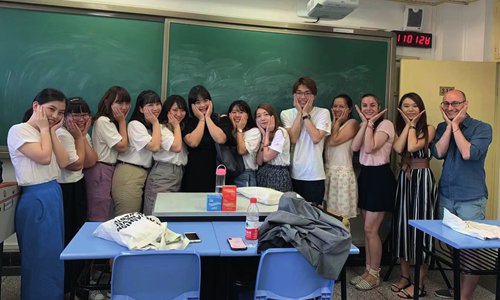HOME >> WORLD,METRO BEIJING
Civilian exchanges between China and Japan increase as diplomatic ties warm
By Wei Xi Source:Global Times Published: 2019/9/3 18:38:40

Japanese students pose for a picture at the Great Wall. Photo: Courtesy of Hiromi Horage
For Hiromi Horage, chief of the international programs office at the Bunkyo Gakuin University's Hongo campus, this has been one of the busiest years of her career, with the highest number of students applying for summer study tours in Beijing.
"Usually we would have 10 to 12 students, but over 30 students came this time," Horage told the Global Times, adding that the number of Japanese students visiting China is often influenced by relations between the two countries.
"It is mainly because of these students' parents, which can be seen as a reflection of society as a whole," Horage explained.
And it seems to be the same on the Chinese side. According to data from Japan Tourism Statistics, in 2018 the number of Chinese tourists to Japan, excluding those from Hong Kong and Taiwan, reached 8.38 million and accounted for the highest number of foreign visitors that year. Japanese Prime Minister Shinzo Abe had paid an official visit to China in October that year, the first visit by a Japanese prime minister in seven years.
Ayumi Nakai is a freshman student coming to China for the first time. She was greatly impressed by the restaurants near the Chinese campus and historical sites in Beijing such as the Forbidden City, Summer Palace and the Temple of Heaven. "I already told my friends how amazing China is," Nakai told the Global Times.
It was the major sightseeing spots that left the deepest impression on Nana Yahagi when she came last summer, but she now has a much broader view of the country.
"I [used to] think that Chinese people are selfish, but after I came here last year, I found Chinese people are kind and some are real gentlemen," said Yahagi, who has now applied for a study abroad program at the Beijing Language and Culture University for a year.
"After [last year's] semester ended, I really liked it and I really wanted to [come back], so I decided to study in this university again," Yahagi said, adding that she wishes to use Chinese as a working language in the future.
Kyoshin Sasahara, who is now in his third year in Bunkyo Gakuin University, went to study in Minnesota, US last year. "After I studied English, I feel like I need to be able to speak Chinese as well, because the population of Chinese [speaking people] is getting bigger and bigger," the junior student said.
After getting a negative impression of China from what he learned about its politics and environment in Japan, Sasahara said that he met some Chinese students in the US, and it was through them he became interested in China.
"After I came here, I found China is not that bad. It [does] have some problems but it's better than I expected," Sasahara explained, adding that some Chinese students from Chengdu came to meet him when they learnt he was in Beijing, and they had a very good time together.
As for what impressed him the most over the past month in Beijing, Sasahara replied it is the people.
"How this many people can live in this city is impressive to me," Sasahara told the Global Times. "You know, once you go out of the campus, you see a lot of people, a lot of cars, and a lot of bikes. I don't know how they live together… whenever I walk on the street, I feel unsafe because many bikes are going next to me and almost crash."

Japanese students and their classmates at the Chinese class at Beijing Language and Culture University. Photo: Courtesy of Aika Shiozawa
Leaving comfort zone
Having taken Japanese college students to Beijing for almost 20 years now, Horage said while Chinese young people are very enthusiastic about studying abroad, their young peers in Japan often prefer to stay in their home country, because they feel life at home is more comfortable. However, both the Japanese government and universities are encouraging youngsters to walk out of their comfort zone.
Data from Japan Tourism Statistics shows that there was a quick rise in the number of tourists going abroad, surging from 4.95 million in 1985 to 16.8 million in 1997 at the peak in the 20th century. However, entering the 21st century, the number of Japanese overseas travelers only grew from 17.82 million in 2000 to 18.95 million in 2018.
Sasahara added that compared with the older generation, young people like him are more willing to go out, but "mainly for traveling."
While young people are all interested in pop culture and like to talk about relationships, Sasahara noticed that Chinese youth are more curious about politics. Japanese are not, because he thinks politics "is not close to my life."
Yahagi added that after staying in both nations, she finds that Chinese people are more straightforward in expressing ideas about what they like and do not like, therefore she thinks the way Chinese people live is more suitable for her. However, her parents still have concerns about the environment and air pollution in China.
Horage agrees. She said that while there are safety concerns, parents of Japanese students "are more worried about the environmental problems in China," and stereotypes still exist.
While some historical issues cannot be put aside, Horage thinks the best way, looking to the future, is to provide more opportunities for younger generations to get to know each other. "Sometimes it might be only a few days in a foreign land, but that could still influence their whole lives," Horage said. "Young people have their ways of looking at the world, and we should just provide opportunities for them to communicate with each other."
Newspaper headline: Learning experience
Posted in: ASIA-PACIFIC,METRO BEIJING,CULTURE